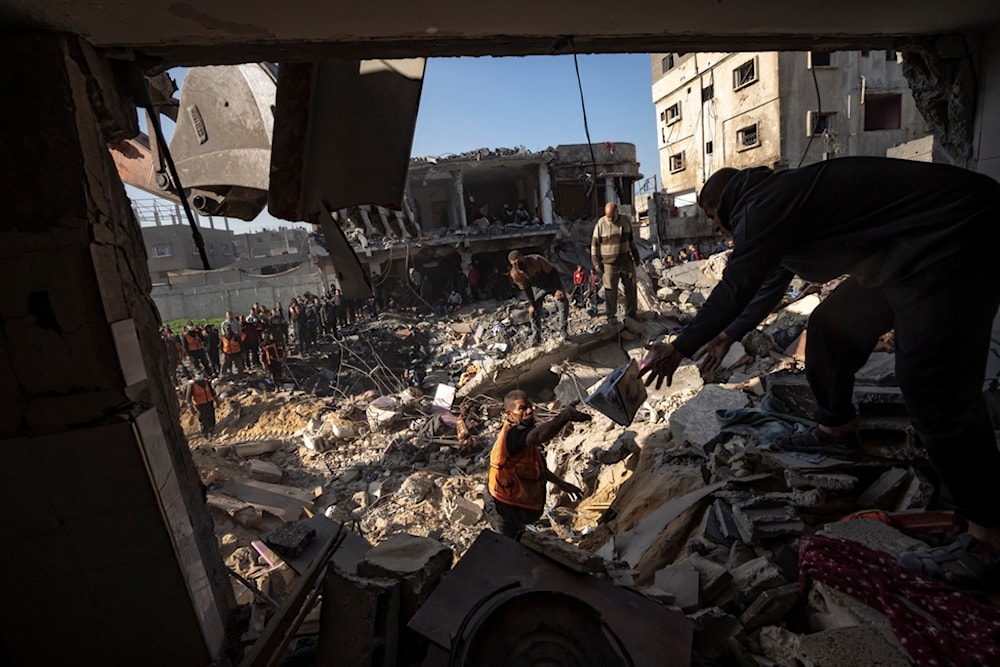Israelis unable to shift south due to heavy battles in north Gaza: WSJ
At a recent meeting with the Israeli leadership, US officials reportedly emphasized the need for targeted raids to reduce civilian casualties, facilitate humanitarian aid, and garner international support.
-

Palestinians search for bodies and survivors in the rubble of a residential building destroyed in an Israeli airstrike, in Rafah, southern Gaza Strip, Tuesday, Dec. 19, 2023 (AP Photo/Fatima Shbair)
Top US officials are claiming they are urging "Israel" to shift to more targeted raids in Gaza to limit civilian casualties, allow more humanitarian aid to reach the enclave’s population, and regain more international support for the effort, the Wall Street Journal reported on Tuesday.
According to WSJ, Israeli forces continue to face unexpectedly fierce fighting in northern Gaza, delaying their efforts to shift their focus to southern Gaza, especially the city of Khan Yunis.
Defense Secretary Lloyd Austin and Air Force Gen. CQ Brown, the chairman of the Joint Chiefs of Staff, conveyed their appeal during meetings with Israeli Prime Minister Benjamin Netanyahu and other Israeli officials during their visit to the occupied territories on Monday night.
These meetings were part of a diplomatic effort led by the US and other Arab countries to launch the first stages of concluding the Israeli aggression on Gaza.
US officials have privately expressed a preference for witnessing a reduction in the scale of the aggression within weeks rather than months.
Earlier today, informed sources in Geneva revealed to Al Mayadeen that Israeli officials have disclosed to some UN-affiliated organizations operating in Gaza that the war will continue for at least two more months, and perhaps even longer.
Read more: US urges 'Israel' against invasion, pushes for 'surgical' options
During a press conference with Israeli Security Minister Yoav Gallant on Monday, Defense Secretary Lloyd Austin revealed that recent discussions with Israeli officials included scaling back military aggressions in Gaza and transitioning to more 'surgical' actions. He emphasized sharing insights based on the US's alleged experience in fighting so-called terrorist groups.
"We can offer some insight based upon our own experience in fighting terrorist groups and certainly that enabled us to have great discussions," he said, adding that "we also have some great thoughts about how to transition from high-intensity operations to lower intensity and more surgical operations, so we had great news on those issues."
In the previous week, national security adviser Jake Sullivan urged Israeli leaders to move away from depending solely on airstrikes and ground assaults in Gaza. Instead, he emphasized the importance of adopting targeted military operations. US officials revealed that Sullivan warned Israeli leaders that a prolonged conflict would complicate the governance of Gaza in the aftermath of the aggression. The same message was reiterated during the meetings on Monday.
Some observers said they were skeptical about "Israel" achieving victory within a timeline set by the US, particularly if there is pressure to diminish the intensity of its ground invasion by the end of January.
"If we end the war right now, it will be a terrible Israeli defeat," said former IOF general Giora Eiland. He added that withdrawing ground forces and transitioning to airstrikes and commando raids would not effectively eliminate the resistance.
Hatim Salim, a resident of the Al-Daraj neighborhood, told WSJ that the past few days have been very rough on the remaining residents of Gaza City. "Tanks shelling hasn’t stopped, neither by day nor at night. Most of the evacuees left," Salim said. "But we live here—where should we go?” He mentioned that the IOF was sending messages to people, instructing them to go to shelters. "What shelters?" he asked.
Read more: Police minister, IOF Chief of Staff have heated dispute in Cabinet

 4 Min Read
4 Min Read








